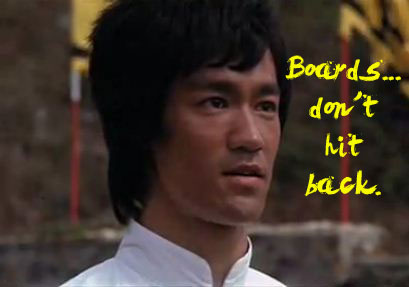
Is this the right room for an argument?
One of FtB’s own has blundered recklessly into one of the worst tactics of Argument Clinic: referring to “political correctness.” In this installment of Argument Clinic we will discuss using the techniques of linguistic nihilism, as well as basic argumentation 101 (introductory level) to analyze discussions of “political correctness.”

Input, line 1: term “political correctness” undefined. STOP.
Calling something X for any given X is almost always an example of labelling,[argument clinic: labelling] unless it’s simple statements of fact. It may be a strong attack to call someone’s argument “LIES, DAMN LIES” but only if the label “LIES” applies to the argument. Otherwise, the attacker is simply engaging in bloviation.[*]
As an example of a label, political correctness may be attacked using linguistic nihilism. The simplest destroying parry against someone trying to characterize you as being politically correct is to drag their definition into a quagmire:
By ‘political correctness’, are you using the traditional, ironic hipster definition, or the current alt-right definition?
That’s probably too ruthless: we are here to have a 10 minute argument, not emulate some kind of verbal Conan the Barbarian delighted by the lamentations of our enemies. The most subtle counter-attack doesn’t expose any of your precious flesh to a riposte:
What do you mean by ‘political correctness’, anyway?

Let’s Dance.
You’ll note that the Conan the Barbarian counter-attack loaded on an LD50 of well-poisoning and false dichotomy in that return. If your opponent is a beginner, they will fall facefirst into the quagmire you pointed out – the one with the sign reading: “this way to a land war in Asia!” The second counter-attack invites your opponent to more clearly define what they mean, which is a forced error for them if they do: they are open for a socratic death of a thousand cuts, or a devastating beat attack, “Ah, I see. You have no idea what you’re talking about.” Or my favorite, which is a flat denial.
Imagine your opponent plays back with an attempted parry/remise:
“By ‘political correctness’ I mean adhering to the social trend of not speaking ill of islam out of fear of being called ‘islamophobic’ and having ones words policed by the social justice warrior elite!”
Ok – that’s a bit of a gimme; I doubt any of us will ever argue with someone who throws their throat onto the blade of your sword like that. But, our most devastating response is:
Oh, right, I thought that might be what you meant. Well, that doesn’t apply because I’m not at all afraid of speaking ill of islam – it’s bullshit – see? And, uh, did you have a point?
This is pure linguistic nihilism as discussed at length in the appropriate episode. At the point where your opponent threw a vague label, they metaphorically tied a rope around a couple cinderblocks and threw them over the side of the boat. All you need to do from there is watch them thrash and lean down and cut their throat with a sharp knife, if you’re feeling merciful.
Another meta-attack can be deployed against political correctness: it is a strawman argument if it is ever applied against anyone, ever. Remember, per Argument Clinic on labelling: a straw man argument is one in which you mis-characterize your opponent’s position, then attack the mis-characterized position. Since “political correctness” is a label with no substance, you can attempt a destroying parry by asking them to define what they mean by political correctness then say:
No, that’s not me.
or
Oh, I see, you’ve set up a strawman called “political correctness” and are wasting quite a bit of energy thrashing it. When you’re done with that, why don’t we talk about the actual issues?
 The sarcastic construction above is what I call the “Boards… don’t hit back” response. If you’re playing nice, you give your opponent a chance to re-position themselves. If you’re not, you re-position them with some well-poisoning: offer your own definition of ‘political correctness’ and then make sure it can never apply to any argument you’ve ever made, ever. There’s a variant of that technique I call the “Sam Harris Gambit” which is to claim that you were misunderstood, and try to move to solid ground from which you can remise your argument. By the way, if anyone ever tries that lame move on you, you can slam your weight on the arch of their foot by saying, “Well, then try to be clearer” and then stand on their toe and ask them “please, do me the favor of defining your terms so we don’t have this problem again” and then drag them into the quagmire.
The sarcastic construction above is what I call the “Boards… don’t hit back” response. If you’re playing nice, you give your opponent a chance to re-position themselves. If you’re not, you re-position them with some well-poisoning: offer your own definition of ‘political correctness’ and then make sure it can never apply to any argument you’ve ever made, ever. There’s a variant of that technique I call the “Sam Harris Gambit” which is to claim that you were misunderstood, and try to move to solid ground from which you can remise your argument. By the way, if anyone ever tries that lame move on you, you can slam your weight on the arch of their foot by saying, “Well, then try to be clearer” and then stand on their toe and ask them “please, do me the favor of defining your terms so we don’t have this problem again” and then drag them into the quagmire.
Another fun way of dismissing labels is to redefine them out of existence. That ploy takes fast-talking and an unsophisticated opponent. If you find yourself in that situation, and are feeling merciless, you can try something like this:
You know, “political correctness” is just a whine. It’s a label and it means “something I don’t like” Never mind that’d be circular argument, it’s just – sad – really. Why don’t you say what you mean?
Again: redefinition as a redirection, linguistic nihilism as a shield, and labelling your opponent right back as a red herring to distract them.

*The astute student of Argument Clinic will have immediately raised hackles at my use of “bloviation” in this context. If your hackles raised, you have passed the test. Otherwise, you are doomed to accept that “bloviation” is what I say it is, and I didn’t say what it is. This is a textbook example of labelling.

That’s everything in a nutshell. The term political correctness far predates hipsterism, it’s been around for a very long time, and almost from the outset, used derisively by those who were being all ragey over being called out on their bigotry and other human failings. I remember people being all bent out of shape in the late ’70s over “not being allowed” to call a mentally challenged person a retard/tard/retread. The latter was popular with people who worked at Camarillo State Hospital.
I made the point that you could call them whatever you wanted, but they needed to shut the fuck up when others looked at them askance for being such shitty human beings.
The major premise of this article seems to be that Political Correctness is merely a fever dream of the Right, but it is undoubtedly a real-world phenomenon. The problem, as always, is the application of the term. The overuse and misuse of the term by conservatives shouldn’t blind us to the fact that PC — political therapy via linguistics — actually exists.
The best critique I’ve read of PC is by the late Australian art and social critic Robert Hughes in Culture of Complaint.
* Anyone reading this should read that entire book, actually. Prescient warnings of the dumbing-down of America by reality TV…
Polishsalami @2 : So – you have some good examples of this? The ‘best critique’ is nearly a quarter-century old. Surely for something real enough to be a problem, there would have been something more modern?
Oh – how about the restriction on the use of ‘nigger’ (look, I didn’t even say, “the n-word”, how edgy!)? Is that ‘PC’ or simply common decency? Should we avoid calling women ‘bitches’?
“The major premise of this article seems to be that Political Correctness is merely a fever dream of the Right” – did you *read* the article? Where did he characterize this as a problem of ‘the Right’? Did he say, anywhere, that it did not exist at all?
As he asks – “what do you mean by ‘political correctness’ anyways?
polishsalami@#2:
The major premise of this article seems to be that Political Correctness is merely a fever dream of the Right, but it is undoubtedly a real-world phenomenon.
No, the major premise of this article is that using the term “political correctness” in a non-comedic manner invites having one’s argument dismissed in toto.
it is undoubtedly a real-world phenomenon
Of course. Because labels are clusters of real world phenomena, they appear to mean something until they are examined closely. For example: Liberty. Well, we all know Liberty is good, right? And, to your point, it’s obviously a real world thing because people are willing to die for it, etc. But what is it? When we start decompiling a label we often discover it’s a package of vague concepts and even contradictory concepts. Is my Liberty to swing my fist interrupted by your face? And is your liberty to be un-face-fisted interrupted by my liberty? Etc. We can see intuitively that the label has real meaning and real world application, because the real world is full of faces and fists, but it turns out that the label means whatever each of us wants it to in a certain situation – in other words it’s a placeholder for having a belief that can be articulated.
felicis@#3:
Oh – how about the restriction on the use of ‘nigger’ (look, I didn’t even say, “the n-word”, how edgy!)? Is that ‘PC’ or simply common decency? Should we avoid calling women ‘bitches’?
That’s a good example of what I was talking about, yes.
When I think of “political correctness” my image is not of racists grumbling that they can’t use abusive racist language) bur rather of the cultural revolution in China. I have read scary accounts of people who did not adopt the proper language-style that was in vogue, and were “reeducated” or even killed for it. That bothers me – the very image bothers me – as it is intended to. In fact, the term “political correctness” attempts to hearken back to that time, to imply that there are people having their lives destroyed because of verbal fashions. When someone is arguing against “political correctness” they appear to be trying to inject an emotional appeal into the discussion by freighting in all of the horrors of the cultural revolution and the wars of religion. But, at the same time, they are saying “words shouldn’t matter.” Well, if words shouldn’t matter, me saying “your use of that word is repugnant to me” shouldn’t matter either. Or, if words should matter, you saying that word is probably not a good idea. This is how I mean that “political correctness” (like Liberty, in my #4 above) can be decompiled into contradiction.
My opinion is that people who are complaining about “political correctness” are using emotionally loaded cultural references to tilt the field of speech toward their position. That’s a standard emotional appeal – similarly to saying “Liberty!” we don’t know what it is but we know it’s good. It’s a really basic, sloppy, rhetorical trick.
Me@#5:
to imply that there are people having their lives destroyed because of verbal fashions
In other words they are implying that it’s wrong to destroy someone’s life for their actions because their actions are “mere words”
Another way of slicing this knot is to observe that words are actions. They’re not special, they’re on a spectrum. So if someone says “I will not make wedding cakes for gay people” they are expressing an action in words. Their words are not the thing that people are repelled by, it’s the statement of underlying action (homophobia) the words are conveying. It is not impinging on their freedom of speech* to say “that is inappropriate” because there are reasons why the action may be deemed appropriate or inappropriate that are not relevant to whether they expressed it in words or not. We are not saying that the baker who refuses to make a cake for gay people should suffer a loss of business because of what they said, but because of how they profess to act. Saying that the baker is being hounded out of business by “political correctness” is an attempt to apologize for their words while letting their action stand.
(* whatever that is)
felicis@#3:
By the way, that’s another good counter-attack against someone whining about political correctness: “Are you complaining that you, a privileged white person, get glared at when you use racialized language to a black person? Is that what you’re on about?”
Marcus – @ – several –
I was just taking and extending your clinic (which I did read and pay attention to, great series, by the way!)
I can take no credit for originating that particular riposte – it’s been around for a few years, though I did add a particular twist to it – deliberately using (some of) the offensive words, which prevents the ‘PC’ label from being attached back to me.
‘I’m not arguing against your anti-PC position because I am PC, but because —‘
“PC”, “SJW”, “Troll”, “Fascist” are all words that used to mean something, but have become code for “something I don’t like”
I use them still, but always in closed company where the meaning is agreed upon and understood by all. For the first two, I have reverted in public conversation to phrases like “dangerous pursuit of ideological purity” which seems to be less vague, and which has the virtue of being too clunky to co-opt enjoyably.
I don’t think I’ve ever been to Anjuli’s blog since she joined FTB.
… Holy shit.
invivoMark@#10:
Well, in case someone is laboring under the impression that FtB speaks with one voice, and we all agree about everything…
felicis #3:
No, don’t! You’ll summon the Ghost of Steers! (unless Marcus has pre-emptively blocked him)
Hughes’ commentary from the early 90s is worth reading for a number of reasons. It was written at the peak of right-wing hysteria over PC; it comes from a left-ish liberal humanist perspective; and the criticisms Hughes made of PC are still pertinent today.
Marcus, you left out tu quoque. A very sustainable argument toward any ideologue.
(And, arguably, in this case not a fallacy of irrelevance)
polishsalami @12 :
“the criticisms Hughes made of PC are still pertinent today.”
Are they? Why? Again – I asked you for some specific examples of political correctness being a problem – instead you want me to read a 24-year-old book that has a criticism of political correctness from the late 80s and early 90s – which were largely illusory _then_.
Before I start into a criticism of political correctness – show me why I should care enough to take the time. Who is being cast aside in the name of linguistic purity?
John Morales@#13:
Marcus, you left out tu quoque. A very sustainable argument toward any ideologue.
Good point! I usually try to avoid that particular argument because it tacitly admits more than I want to; it’s sort of like the “entrapment” defense, it means you’ve admitted that you did whatever it was, which seems to be a weak move.
polishsalami@#12:
Re: Hughes
I would expect a scholarly treatment of PC to be going behind the label and deconstructing it, to attack in detail the various problems Hughes sees in it. As such, I would expect that he probably makes some good points: for example some of the reviews of it on the internet it says that he “Offers a detailed semantic analysis of the way that key words have been exploited both to advance the agendas of political correctness and to refute them.” That sounds pretty reasonable to me: words are distorted for political agendas all the time. Of course, calling something PC is also distorting words for an agenda.
I see from the reviews (I don’t think I will buy and read the book, my input queue terrifies me right now) that Hughes also complains about “authenticity” – so do I! And it makes me wonder when he complains about “authenticity” if he is even talking about the same thing as I am hearing. Words are such poor tools!